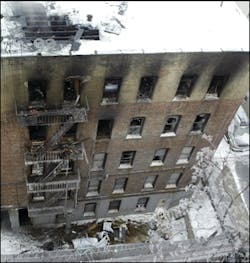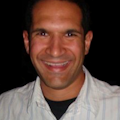Black Sunday Survivors Recount Harrowing, Deadly Jump For First Time
On Jan. 23, 2005, six FDNY firefighters jumped from the fourth floor of a burning apartment building in the Bronx in a desperate act to save their lives from the fire consuming the rooms behind them.
Two firefighters, Lt. John Bellew and Lt. Curtis Meyran, died in the jump. Later that day firefighter Richie Sclafani was lost in a fire in Brooklyn. The day would become known as "Black Sunday." It was the first time the city had multiple firefighters die in separate incidents in the same day.
At the Firehouse Expo in Baltimore last Thursday, the four men who survived the jump told their story for the first time to thousands of firefighters from across the country.
Rescue 3's Joseph DiBernardo and Jeff Cool, and Ladder 27's Eugene Stalowski and Brendan Cawley candidly spoke about their emotions, the incident and what they learned from the tragedy.
"We thought about doing this for a while but kept telling ourselves, 'No, we're not going to do that,' " Cool said about talking to an audience. "But, we're here for the brothers. That's what it's all about. It can happen to you. You might think: 'It's not going to be me,' but if you're not on the top of your game, it could be you."
Black Sunday
Cool said that snowy winter morning at the station started out like any other when they received the apartment fire call at 7:59. "We had an early run that morning and we were sitting in the kitchen drinking coffee. No one knew what was about to happen that morning."
Weather played a big part in the day's conditions; something Cool knew would affect their ability to fight fires. "Snow kept coming down; all night long it was coming down."
Winds from the storm reached an excess of 45 mph, with temperatures in the teens freezing over the hydrants at the fire scene.
Stalowski said the call started out as just another fire. "I don't remember entering the building. The only thing I remember is getting to the fire floor. At that point, the smoke condition wasn't bad yet."
He was searching the apartment with Lt. Meyran for signs of civilians or traces of fire. "I went to the left and Lt. Meyran went to the right. We didn't find any civilians and hadn't seen any fire."
Cawley, who was new on the job, was on Stalowski's crew. "Being the new guy in the company, I remember how exciting it was just to go into the building," he said.
Soon, Cool would find a pocket of fire as he opened a wall. That's when he said things took a turn for the worse. "The smoke was a moderate condition at best," Cool said, adding when he found the fire in the wall, "It got very confusing in there, very quickly ... I turned around and there was fire from the floor to the ceiling. We were trapped."
DiBernardo, who was in the room next to Cool and close to Lt. Bellow, said they stayed in the building after receiving calls that there were still civilians in the building. "We knew we were out of water, but we thought there were still people there," he said. "I went to the hallway and saw nothing but orange."
In another part of the building, Stalowski said Engine 24 brought in water, but it only made things worse when combined with the strong winds. "That's when things took off," he said.
As Stalowski, Cawley and Meyran were trapped in a bedroom, they were losing air. The three firefighters did everything they could do, sharing the remaining air. That's when they huddled at an open window to get a breath.
"I really thought the side of my face melted with the heat," Cawley said. Soon after, Meyran fell from the window. "I watched Curt land and it was something I never want to see again," he said. "I thought for sure I'd be the next to fall, holding onto the window. Gene kept coaching me, telling me I could do it.
"When I fell, I hit my left shoulder. I was told we were doing something like 40 to 45 mph going down." Out of the four survivors, Cawley's injuries were the least severe, with the other three confined to wheelchairs months after the fire. Stalowski was the next to fall.
Meanwhile, Cool and DiBernardo kept in contact and were able to spot each other from neighboring windows. Cool was the only firefighter out of the six that carried a rope with him that day. The FDNY stopped providing Personal Safety Systems to firefighters in 2000.
"I tried to find a place to tie the rope off to and couldn't. That's when Joey yelled for me to throw it to him," he said. "We knew what the condition was like in that room. Joey described it as a locomotive. Any second and it was going to flash over.
"If that rope wasn't there, we would've been dead."
Ropes Saving Lives
Cool bought the rope at the 2004 Firehouse Expo in Baltimore. He said the system cost him over $300. "A New York firefighter doesn't make a lot of money, so you better believe my wife gave it to me when I got home," he said. "I told her, 'One day this rope's going to save my life.' Who would've known, six months later" it would.
Before Cool used his rope that day, there were 33 documented cases in the FDNY of a rope rescue. "When I was released from the hospital I said, 'Get ropes and harnesses for the firefighters.' We have them back again," he said, stating that he wants federal legislation passed to make P.S.S. mandatory for all firefighters.
DiBernardo said that day, his rope was buried at the bottom of his locker. "Thank God you brought that rope with you that day, Jeff," he said.
After securing the rope, Cool and DiBernardo attempted to rappel down the building, but it soon snapped. "It saved my life, those ten feet during my descent," DiBernardo said. "Those 10 feet saved my life; those 10 feet saved Jeff's life."
By the time they reached ground, it was too late to save Bellew, who lay dead alongside Meyran in the snow.
Stalowski said he wishes he had a personal safety system on him, and stressed the importance of the equipment. "It may be too bulky, too heavy for a couple of months," he said. "But before you know it, it's like it's not even there"
The Road to Recovery
Several of the recovering firefighters were in comas for days after the fire. All of them said the support they received helped them and their families through the recovery process.
"Having a firefighter there (with your family) was so important," Cool said. "They knew the extent of it, they knew how to comfort and could tell stories to keep their minds off of it."
DiBernardo, who was in an induced coma for 18 days, said it was firefighters who took care of him when his family could not. "Late at night when they finally kicked my family out, there were my brothers," he said. "Sleeping next to me and doing whatever needed to be done."
"Every one of us is hurt in our own different ways," Cool said. "We went though the same things and are all dealing with our own injuries to this day and the brothers are still there.
"We're going to remember Curt, John and Richie for the rest of our lives," he said.
Touching Others
Moments after the lights went up, many in attendance reflected on what they had heard.
"It was so moving, It's hard to describe," Brian McCormick, a firefighter with Los Angles County, Calif., said. "God certainly was with them."
Brandon Shannon of Somerset, N.J., said he was touched by the stories and believes those in attendance went away with a powerful message. He said he and his fellow firefighters carry ropes, and have plans to beef up the training.
The message of using personal safety systems was felt by many of the firefighters. "I wish every firefighter could hear their story and learn the importance of the personal safety system. I thank God that the four of them were able to survive that tragedy," Yates County, N.Y. fire coordinator Glen Miller said.
Elmont, N.Y. Fire Chief John Urbanowicz said the story of the Black Sunday survivors inspired him. "It really showed the brotherhood between the volunteers and the paid service. It was a very emotional story," he said. "Carry that rope man, whatever you do, carry that rope."
Related Full Coverage:
About the Author
Paul Peluso
Staff Writer
Paul Peluso is a Firehouse.com staff writer and has worked for the Web site since 2006. Previously, he worked as a reporter for several community newspapers located in the suburbs of Baltimore, Md. Since joining the newsteam, Paul has covered various fire service issues including fire sprinklers, grants, line of duty deaths and technology. While he started out at the Beltsville, Md. office, he has since moved to Florida where he works out of his home office in Tampa.

